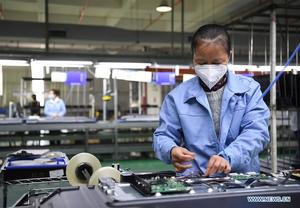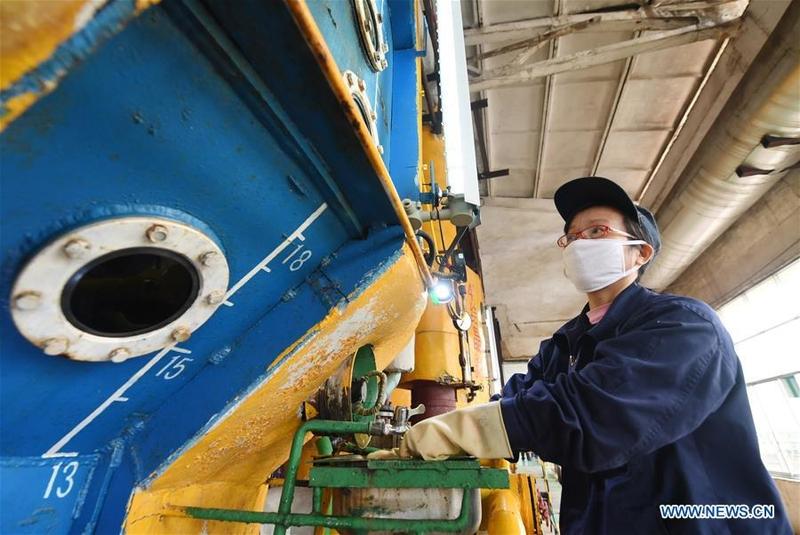 Staff members work at a workshop of Skyworth in Guangzhou, south China's Guangdong province, Feb 10, 2020. Chinese authorities are carefully balancing efforts to control the novel coronavirus epidemic and minimize its impact on the economy as millions of people head back to work after an extended holiday. (DENG HUA / XINHUA)
Staff members work at a workshop of Skyworth in Guangzhou, south China's Guangdong province, Feb 10, 2020. Chinese authorities are carefully balancing efforts to control the novel coronavirus epidemic and minimize its impact on the economy as millions of people head back to work after an extended holiday. (DENG HUA / XINHUA)
Millions of Chinese have begun returning to work starting Monday, raising public concerns over clusters of the novel coronavirus.
Wu Zunyou, an epidemiologist at the Chinese Center for Disease Control and Prevention, said at a news conference on Tuesday that a cluster refers to the occurrence of more than two cases in a relatively small unit.
He said after analyzing nearly a thousand clusters across the country, 83 percent happened within families, but other gathering places such as medical institutions, schools, shopping centers, factories and enterprises also have the possibility of a cluster outbreak.
READ MORE: On Chinese mainland, it's slowly but surely back to work
To reduce the risk of cluster outbreak caused by centralized work and collective dining, many enterprises approved more flexibility, arranging different shifts and allowing work from home.
As the disease has a long incubation period and shows no obvious symptoms in the early stage, it is difficult to identify how employees are infected
Employees are asked to wear face masks and bring their own tableware and return to offices for dining.
On Jan 23, the Ministry of Human Resources and Social Security, Ministry of Finance and National Health Commission issued a regulation clarifying medical staff who are infected with the novel coronavirus or die due to the infection during prevention and treatment work shall be identified as work injuries.
As people have started to return to work, many have raised questions about if other employees should also be classified as work injuries if they are infected with the disease in the performance of their own duties or on their way to work.
Yang Baoquan, a lawyer at Zhong Yin Law Firm, told China Youth Daily the regulation clearly applies only to medical staff during their epidemic prevention work, but not general employees.
Yang said there is no direct legal basis for general employees identifying an infection as a work injury, and it is difficult to determine whether the infection happened at work or during the course of daily life.
 An employee works at a workshop of a branch of Nanning Sugar Industry Co, Ltd in Nanning, south China's Guangxi Zhuang Autonomous Region, Feb 10, 2020. (LU BOAN / XINHUA)
An employee works at a workshop of a branch of Nanning Sugar Industry Co, Ltd in Nanning, south China's Guangxi Zhuang Autonomous Region, Feb 10, 2020. (LU BOAN / XINHUA)
As the disease has a long incubation period and shows no obvious symptoms in the early stage, it is difficult to identify how employees were infected. If the regulation applied to them, it would cause a loss to the work injury insurance fund, he added.
ALSO READ: Premier stresses resuming work, ensuring supply amid epidemic
In addition, according to the regulations of the Work Injury Insurance Regulation, accidental injuries due to work reasons are counted as work injuries, but infection of novel coronavirus cannot be counted as an accident, he said.
"These reasons have led to inconsistent views on this issue in practice, but the mainstream view is still that professionals other than medical staff who have contracted the novel coronavirus should not be considered work injuries," he added.



